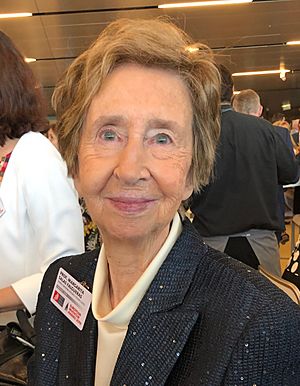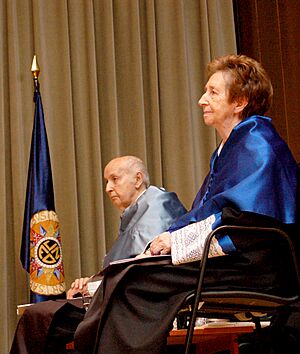Margarita Salas facts for kids
Quick facts for kids
The Most Illustrious
Margarita Salas
|
|
|---|---|

Salas in June 2019
|
|
| Born | 30 November 1938 Valdés, Spain
|
| Died | 7 November 2019 (aged 80) Madrid, Spain
|
| Nationality | Spanish |
| Alma mater | Complutense University of Madrid |
| Known for | Studies of molecular genetics and discovery of Φ29 DNA polymerase |
| Spouse(s) |
Eladio Viñuela [es]
(m. 1963) |
| Awards | Premio México de Ciencia y Tecnología (1998) European Inventor Award (2019) |
| Scientific career | |
| Doctoral advisor | Alberto Sols |
Margarita Salas Falgueras (born November 30, 1938 – died November 7, 2019) was a very important Spanish scientist. She was a medical researcher and writer who worked in biochemistry and molecular genetics. She was also known as the 1st Marchioness of Canero.
Margarita Salas helped start the field of molecular biology in Spain. She worked as a professor at the Severo Ochoa Biology Center. In 2016, she became the first woman to receive the Echegaray Medal. This special award was given to her by the Royal Academy of Exact, Physical and Natural Sciences.
Her discovery of the bacterial virus Φ29 DNA polymerase was very important. The Spanish National Research Council said it was the highest-earning patent in Spain. Her work made it easier and faster to copy tiny amounts of DNA. This meant scientists could test DNA for many purposes.
She was the first female scientist ever chosen for the Royal Spanish Academy. Just before she passed away, she won the 2019 European Inventor Award. King Juan Carlos I gave her the special title of Marquesa de Canero in 2008. Throughout her career, she guided over 40 students getting their PhDs. She also wrote more than 200 scientific articles. Margarita Salas was a strong supporter of women in science.
Contents
Early Life and Education
Margarita Salas Falgueras was born on November 30, 1938. Her hometown was Canero, in Valdés, Spain. Her father, José Salas Martínez, was a psychiatric doctor. He encouraged her to be interested in science. Her mother, Margarita Falgueras Gatell, was a teacher.
She had two brothers who also became scientists. When she was sixteen, she moved to Madrid. There, she took entrance exams for Chemistry and Medicine. She chose to study Chemistry. In the summer of 1958, she met Severo Ochoa, a famous scientist. He helped guide her towards studying biochemistry.
Margarita Salas earned her bachelor's degree in chemistry from the Complutense University of Madrid. She then received her PhD in 1963. Her PhD supervisor was Alberto Sols.
Starting Her Research Career
After finishing her PhD, Margarita Salas traveled to the United States in 1964. She went with her husband, Eladio Viñuela, whom she married in 1963. They worked with Severo Ochoa in New York.
When they returned to Spain, Salas and her husband set up a lab. They wanted to research molecular biology in Madrid. In 1970, her husband started studying a different virus. This allowed Margarita Salas to become known for her own scientific work.
From 1968 to 1992, Salas was a professor of molecular genetics. She taught at the Complutense University Faculty of Chemistry. She also became a research professor at the Severo Ochoa Center for Molecular Biology in Madrid in 1974. She led this center from 1992 to 1994.
She was the president of the Spanish Society of Biochemistry (SEBBM) from 1988 to 1992. She also directed other important scientific groups. She helped grow Spanish research in biochemistry and molecular biology. She was an honorary professor at the Spanish National Research Council (CSIC).
Margarita Salas passed away on November 7, 2019. She was 80 years old.
Key Scientific Discoveries
Margarita Salas was the first female scientist chosen for the Royal Spanish Academy. She joined on December 20, 2001. On July 11, 2008, King Juan Carlos I gave her the noble title of Marquesa de Canero. She guided over 40 students in their doctoral studies. She also published more than 200 scientific articles.
Early Research
After her chemistry degree, Margarita Salas worked in Alberto Sols' lab. Her PhD research was about an enzyme called glucose-6-phosphate isomerase. Then, she worked as a postdoctoral researcher in the United States. She spent three years (1964–1967) at New York University with Severo Ochoa.
The Amazing Φ29 DNA Polymerase
While working in Ochoa's lab, Salas made important discoveries about messenger RNA. She found out how protein synthesis begins. She also discovered and studied the Φ29 phage DNA polymerase. This is a special enzyme from a bacterial virus.
This enzyme is very useful in biotechnology. It can make many copies of DNA from a tiny amount. This discovery changed how scientists analyze DNA. It made DNA analysis possible in fields like archaeology and forensics. In these areas, only very small DNA samples might be found. It also helps in oncology, which is the study of cancer. This method is now called multiple displacement amplification.
In 2012, she became an honorary professor at the Severo Ochoa Center for Molecular Biology. She continued to study the bacterial virus Φ29. This virus infects a harmless bacterium called Bacillus subtilis.
Scientific Achievements and Recognition
Margarita Salas published over 350 articles in international science journals and books. She also had 8 patents for her inventions. She gave presentations at almost 400 conferences. Her patent for the Φ29 DNA polymerase was very successful. It brought in more money for the Spanish National Research Council than any of its other patents.
She was part of many important scientific groups around the world. In 1994, she won the Rey Jaime I Research Award. She also directed the Severo Ochoa Foundation.
She was a member of the Royal Academy of Exact, Physical and Natural Science. She was also a member of the Royal Spanish Academy. Other groups she joined included the European Academy of Sciences and Arts and the American Academy of Arts and Sciences.
Many universities gave her honorary doctorates. These included the University of Oviedo and the University of Murcia. Several schools and streets were named after her. For example, a high school in Majadahonda, Spain, is called Margarita Salas.
In 2007, she became a member of the National Academy of Sciences of the United States. She was the first Spanish woman to join this important group. In 2014, she was chosen for the first "Spanish Selection of Science." This group included thirteen famous Spanish scientists.
In 2018, she received an honorary doctorate from the Universidad Autónoma de Barcelona. She gave a speech about her beloved bacteriophage Φ29. In 2019, the CSIC Biological Research Center was renamed the Margarita Salas Biological Research Center. A new species of sea snail was also named after her in 2020.
Her Role as a Woman in Science
Margarita Salas was known for helping many younger scientists. She guided and inspired them. Some of these scientists include María Blasco and Marisol Soengas. She showed that women could achieve great things in science.
Personal Life
In 1963, Margarita Salas married Eladio Viñuela [es]. They had one daughter. She once said that she waited until she was 37 to have a child. She wanted to make sure she could balance her work and family life. She passed away in Madrid on November 7, 2019, at the age of 80.
Awards and Honors
Margarita Salas received many awards for her important work.
- 1991: Carlos J. Finlay Prize, UNESCO
- 1997: Medal of Principality of Asturias
- 1999: National Research Award Santiago Ramon y Cajal
- 2000: L'Oreal-UNESCO Award for Women in Science
- 2002: Gold Medal of the Community of Madrid
- 2003: Grand Cross of the Civil Order of Alfonso X, the Wise
- 2005: Gold Medal for Merit in Work
- 2007: First Spanish woman to become a member of the National Academy of Sciences (United States)
- 2009: Title of Honorary Ambassador of the Spain Brand
- 2016: Medalla Echegaray, the highest award from the Spanish Royal Academy of Sciences
- 2019: European Inventor Award Lifetime Achievement Award and Audience Award
See also
 In Spanish: Margarita Salas para niños
In Spanish: Margarita Salas para niños
- List of female scientists in the 21st century
- List of Spanish inventors and discoverers
 | Calvin Brent |
 | Walter T. Bailey |
 | Martha Cassell Thompson |
 | Alberta Jeannette Cassell |


